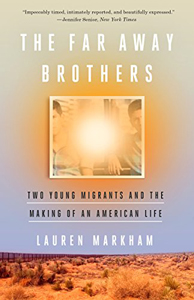 Lauren Markham, The Far Away Brothers; Two Young Migrants and the Making of an American Life (New York: Crown, 2017), 298pp.
Lauren Markham, The Far Away Brothers; Two Young Migrants and the Making of an American Life (New York: Crown, 2017), 298pp.
For close to fifteen years now, Lauren Markham has investigated, researched, written about, and worked with thousands of "unaccompanied minors" who have crossed the border into the United States with "no papers and no parents." Since 2006, she has worked at Oakland International High School in California, a school that was specially designed for newly arrived immigrants, and where 370 students are enrolled from over thirty countries. She is fluent in Spanish, knowledgeable about immigration policies, has done refugee resettlement, and is familiar with the shifting history, demographics, and statistics of immigration.
In her new book Markham tells the story of two boys from El Salvador, the identical twins Ernesto and Raúl Flores (not their real names), along with their extended families. The back story here is the civil war in El Salvador from 1980–1992 that precipitated a mass exodus of some 370,000 people from the country, a staggering 7% of the population. [FN] The war was followed by horrific gang violence — death squads, mutilated bodies, rape, murder of the police, extortion for "protection," and rival drug cartels. By 2008, there were 1.1 million foreign-born Salvadorans living in the United States, about 18% of the country's population that year. In 2011, there were 4,354 homicides, about a dozen every day.
Ernesto and Raúl were born into a poor family of nine kids, with a deeply religious mother and a father who worked the land. To escape the gang violence, the family paid a coyote $6,000 to take an older son Wilbur to the United States, at an interest rate of 20%, and with the precious family property as collateral. Seven years later, in July 2013, gang violence forced Ernesto and Raúl to flee al norte. They were seventeen years old. The three brothers had become hermanos lejanos, or "far away brothers."
Markham is openly empathetic, and well aware of the journalistic ethical questions about being part of the story, but she does not idealize or romanticize her protagonists. There are wild animals, a headless corpse in the Texas desert, cold-blooded murder, detention centers, complicated bureaucracies to negotiate, a new language and culture to learn, nightmares and flashbacks, missed court dates, girls and grades, alcohol and drugs, tattoos and face piercings, and painful choices to make between work, in order to earn money to send back home for their own $14,000 loan that ballooned to $24,000, or school at Oakland International and high school graduation.
What Markham does in this remarkable volume is to humanize what often becomes an ideological argument. In an Afterword at the end of the book, she argues that based upon her own experiences, "very few people actually want to leave their homes." But they feel like they have no realistic alternatives. And while they flee for many reasons, like drought or famine, "today's unauthorized migration across our southern border is driven largely — though of course not entirely — by violence." For more on this subject, see my JwJ reviews of the book by Francisco Cantú, The Line Becomes a River; Dispatches From the Border (2018), and the two movies, El Norte (1983) and Sin Nombre (2009).
NOTE: Óscar Romero, the Archbishop of San Salvador, was assassinated by a right wing death squad on March 24, 1980 while celebrating the Mass in the chapel of the Hospital of Divine Providence.


